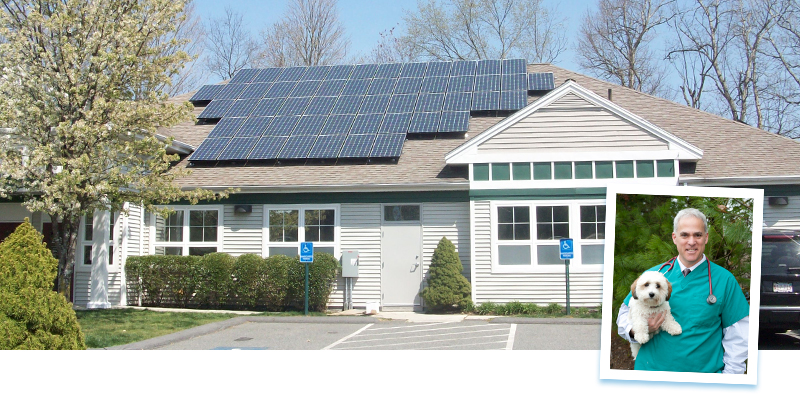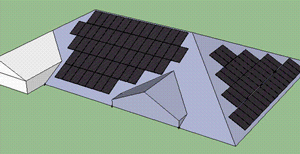Acorn Animal Hospital: No Longer Baking in the Sun

Solar Panels For Business
“Solar is very beneficial financially, saving me money on my electric bill now, and—when the system is paid off—making me a profit.”
Acorn Animal Hospital in Franklin, MA, soaks up so much sun that a standard air-conditioning system couldn’t cool the building bought by Dr. Andy Weitzman in 1994. HVAC repair crews hated servicing the ventilation equipment located in the 130-degree attic. The 25 employees sweated their way through the day. Weitzman put UV filtering on the windows and beefed up the A/C system, and still the full-service, small-animal veterinary hospital baked.
One day, Weitzman looked up at his roof and thought, “Why don’t I utilize that heat instead of battling it?” He contacted several solar companies including New England Clean Energy, but held off on installing a solar electric system because of the high upfront cost.
Fast forward several years to 2011. Panel prices had dropped considerably and suddenly solar was feasible for Acorn. Weitzman had 90 panels installed on two of his roofs, totaling 19.8 kilowatts of clean power generation capacity.
“I wanted to install solar partly because I didn’t feel great about my carbon footprint. But it had to work financially as well,” Weitzman explains. This statement solidified the fact that it was a wise choice to install solar panels for his business.
Electric bill savings, SREC income, and a nearly $30,000 federal tax credit combined to make the numbers work. The system will break even in about five years.
 The hospital’s energy needs — including office and surgical lighting, X-ray and other medical machines, computers, and grooming equipment — are considerable. The biggest draw is the ventilation system that maintains healthy air quality in the hospital’s animal care and boarding areas.
The hospital’s energy needs — including office and surgical lighting, X-ray and other medical machines, computers, and grooming equipment — are considerable. The biggest draw is the ventilation system that maintains healthy air quality in the hospital’s animal care and boarding areas.
Since Acorn’s solar system went live in May 2012, Weitzman saves on average $300 off of his monthly electric bill. The “demand charges” paid by businesses are dropping too, because the hospital requires less power from the local utility with an average of 16% of its electricity now coming from the sun.
Even after adding new office space and a dedicated air-conditioning unit in the grooming salon, in the fall of 2012, the hospital’s electric bills remain lower than before solar.
Weitzman isn’t concerned with dropping Solar Renewable Energy Certificate (SREC) prices. “SRECs are gravy – a nice financial perk to help me pay for the system. But I knew prices would come down because a lot of solar is going up.”
“Solar is still very beneficial financially, saving me money on my electric bill now, and – when the system is paid off – making me a profit.”
Weitzman is as pleased with New England Clean Energy as he is with solar overall.
“New England Clean Energy was absolutely A+ in terms of communication, installation, crews, cleanliness, courtesy, and management. We were busy running the hospital during the installation, animals constantly coming and going, and the crew was very considerate of that.
“Plus, the system looks good. It’s topnotch work, not sloppy. The entire process was very well done.”
In addition to meeting Andy’s primary goals of lower electric bills and environmental responsibility, the solar system delivers other benefits. Clients unanimously comment favorably on the hospital’s commitment to “going green”. And the building’s air-conditioning load has dropped because the solar panels shade the roof and reduce the building’s heat gain. With the attic now about 50 degrees cooler, even the HVAC repair guys are happy.

